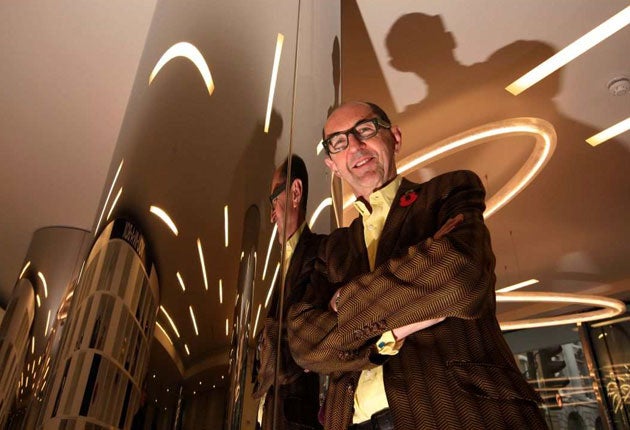The ad man who dreams in colour
Livewire Robin Wight wants to be the peacock figure who transforms advertising, he tells IanBurrell

In the foyer of the media empire that is The Engine Group, there is a honeycomb of white cubicles bearing the names of members of staff who are invited to “represent themselves” with a personal exhibit.
Toys, figurines or football season tickets are arranged in these mini shrines, one of which consists of a set of cutlery and a wine glass. But the most intriguing box of all, featuring what looks like a games console, belongs to the group president, Robin Wight, one of the most famous names in British advertising.
A piece of card reads: “If you want to feel what I’m really like, grip the handles tightly and hang on for at least 30 seconds. Don’t let go!” Follow those instructions and an electric current from this “Robin shocker” contraption pulses up your arms.
Wight bounds into The Engine Group’s cafeteria and orders a cappuccino “with an extra shot”, although he already seems more wired than a Silicon Valley geek. He wears luridly striped Richard James socks and is balancing a pair of media specs so vast that they make Nick Robinson’s look like pince-nez. His motto is a favourite quote from George Bernard Shaw: “I want to be thoroughly used up when I die.”
Wight, like the island with which he shares a name, is slightly out there on his own. But he is also a team player, which explains the concept behind Engine, an entity that comprises 12 media businesses, from advertising agency WCRS to PR company Slice. All of Engine’s businesses occupy the same building in London’s Great Portland Street. Wight darts about from one room to another, explaining how staff from different media specialisms can interact effectively. “The creative molecules collide,” he says.
In his office, he turns to the subject that really excites him: a plan to make the advertising industry less of an exclusive haven for the white middle-classes. Wight was the founder of and brains behind The Ideas Foundation, a charitable organisation which has put more than 200 “creativity scholars”, three quarters of them from ethnic minority backgrounds, through placements in advertising and architecture businesses. Wight has stars of adland such as John Hegarty and Trevor Beattie working as mentors, and he has 22 advertising agencies giving financial support to the project.
He talks 10 to the dozen, reeling off marketing theories, citing books that provide fresh insight into human behaviour and developments in neuroscience. “Have you heard of Black Swan Theory,” he says, “and do you know what a meme is?” His favourite, the subject of a book he has written with a forward by Richard Dawkins and afterwords by Stephen Fry, Alan Yentob and others, is “Peacock’s Tail Theory”, and this he links to The Ideas Foundation and the value of creativity.
The male peacock uses its technicolour plumage to attract a mate by demonstrating the quality of its genes. “Creative people have 50 per cent more mating success than non-creative people, which explains my three wives,” he jokes, a peacock in a vivid suit. “Why do pop musicians and artists have all this mating success? It’s because on an unconscious level their peacock’s tail is on display.”
But the creative talent that exists in some of Britain’s more underprivileged communities is going to waste, because no one is responding to the peacock’s tails, complains Wight, who attended Wellington School and Cambridge. The Ideas Foundation has encouraged creativity, setting young people tasks in creating campaigns to tackle bullying and teenage alcohol abuse, encouraging them to consider careers that they had not thought attainable. He cites the example of a girl who has “gone from a Hackney comp to a job at Bartle Bogle Hegarty”.
Wight evangelises on behalf of the Ideas Foundation, lobbying everyone from schoolteachers to the Culture Secretary, Andy Burnham, and always carries an orange plastic box with props that include a model of the inside of a brain, a peacock’s tail and a miniature of Anthony Gormley’s Angel of the North. Gateshead, he points out, could have spent the money on hospitals, but by opting for the angel they waved their peacock’s tail and their reputation has grown accordingly.
Though he values ideas, Wight says that good ones are very rare. “The best thing you can buy a creative person is a waste paper basket,” he says. “Picasso produced 20,000 pictures, but 5,000 of them were crap.”
Once a copywriter at the legendary Seventies ad agency Collett Dickinson Pearce, Wight co-founded WCRS in 1979. The agency was sold to French media company Havas, but Wight led a management buy-out in 2004 before bringing it within Engine. For 29 years, WCRS has made advertising for BMW. Wight still gets his pen out to work on the account.
In 1987, he stood for parliament. He nearly captured the Labour stronghold of Bishop Auckland for the Tories, polling 19,000 votes with the help of a radio jingle: “Yes, it’s true, Wight can be blue.” Maybe he could have been a politician, or even a scientist. But after Christmas, Radio 4 will broadcast two programmes made by Wight about his time in adland, titled The Most Fun You Can Have With Your Clothes On. He is an adman down to his stripy socks.
Join our commenting forum
Join thought-provoking conversations, follow other Independent readers and see their replies
Comments